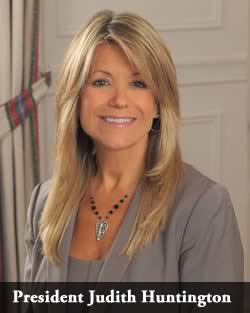New President of The College of New Rochelle, Judith Huntington
By Joan Baum, Ph.D.
 Although Judith Huntington has been president of The College of New Rochelle (CNR) only since July, she made her mark on the institution long before that as president-elect for a year and before that as vice president for financial affairs. A certified CPA, with a long career at the well-known accounting firm of KPMG, providing financial services to various clients, among them, CNR, and also teaching and recruiting for the firm, she came to CNR as its 13th president. She’s not only knowledgeable but also passionate about upholding and advancing the college’s informing Ursuline heritage, which traces its origin to the Order founded by St. Angela in 1535 to educate women for teaching and nursing.
Although Judith Huntington has been president of The College of New Rochelle (CNR) only since July, she made her mark on the institution long before that as president-elect for a year and before that as vice president for financial affairs. A certified CPA, with a long career at the well-known accounting firm of KPMG, providing financial services to various clients, among them, CNR, and also teaching and recruiting for the firm, she came to CNR as its 13th president. She’s not only knowledgeable but also passionate about upholding and advancing the college’s informing Ursuline heritage, which traces its origin to the Order founded by St. Angela in 1535 to educate women for teaching and nursing.
The 108-year-old institution, which comprises four schools — the undergraduate School of Arts and Sciences, for women, The School of New Resources for adults, the School of Nursing (offering a BSN and an accelerated track for students who already have an undergraduate degree) and the Graduate School (these last three are co-educational) — boasts six campuses in the greater metropolitan area, five of which are in New York City. With approximately 5,000 students in all and no drop in enrollment, despite “distressing economic times,” CNR can still lay claim to being an affordable private institution of higher education, says the president, charging approximately $30,000 a year. She takes particular pride in the fact that when the bubble broke in 2008, CNR was in good shape, thanks to careful, conservative investment management. No doubt, her own financial expertise at KPMG, where she was one of the rare women who made partner, played a significant role in ensuring the college’s fiscal health, though she generously credits her mentor, Stephen J. Sweeney, the former president.
How does she see her first year playing out? Advocating for new funding sources and engaging in strategic planning. She is planning a strong fund-raising campaign to offset what may be cuts in federal Pell Grants in two years when the current extension runs out. Approximately 90 percent of CNR students depend on federal and state aid. She also sees the college’s new Wellness Center, completed in 2008, as critical to curricular developments, not only because of CNR’s popular and well-regarded School of Nursing but also because of the marketplace. Eight to 10 new jobs are said to lie in the health professions, she says, and she is eager to serve students seeking careers in these and tech-related areas such as social and human services as well as criminal justice — interdisciplinary programs that also reflect the Ursuline mission. In addition, she says The Wellness Center exemplifies CNR’s dedication to have its physical plant care for the earth. Built with local quarried stone and meeting sustainability criteria, the Center is an all-“green” facility — the pool and locker rooms are underground and there is a rooftop garden that makes it attractive to the surrounding community. Inside, students have multipurpose classrooms — a modern-day realization of St. Angela’s vision 475 years ago.
Aware that much of what she lauds about CNR could as easily be said by many college presidents, Huntington speaks with irrepressible enthusiasm about what she thinks makes CNR unique: its special Catholic intellectual mission, inspired by the Ursuline tradition. That translates for her into “academic rigor” and “a branded image” that CNR is the place to go for “caring, holistic education” of “mind, body and soul,” she says.
For example, though technology is at the forefront of strategic plans to deliver academic programs and student and administrative services, more effectively, she points out that she is committed to continue face-to-face, small-class instruction. It also means that before courses are offered online, there will have been determination by faculty as to what programs would lend themselves to an online aapplication and what faculty training will need to be provided, but even here the instruction will likely be hybrid (half online, half in the classroom) in order to preserve the “human dimension” that she believes is at the heart of the Ursuline mission. #
